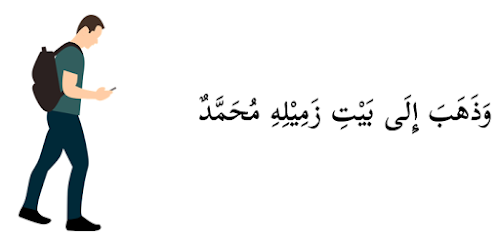Arabic Short Story : Let's Play!
Table of Content [View]
We are going to learn Arabic through short story. I'll tell you a short story in Arabic, then explain you the word by word translation.
By reading the short story, we can improve our Arabic vocabulary and learn basic Arabic grammar.
Notes : I don't explain i'rab or tasrif here, you can study both lesson at another section in this blog. We'll focus on vocabulary and basic Arabic grammar.
The title is "Let's play".
Here is the story
لَبِسَ أَحْمَدُ مَلَابِسَ جَمِيْلَةً
وَذَهَبَ إِلَى بَيْتِ زَمِيْلِهِ مُحَمَّدٌ
قَرَعَ جَرَسَ البَيْتِ
قَالَ أَحْمَدُ : السَّلاَمُ عَلَيْكُم, يَا أُمَّ مُحَمَّدٍ
قَالَتْ أُمُّ مُحَمَّدٍ : وَعَلَيْكُمُ السَّلاَمُ, تَفَضَّلْ, إِنَّهُ فِى البَيْتِ
فَجَاءَ مُحَمَّدٌ وَرَحَّبَ بِأَحْمَدَ
قَالَ مُحَمَّدٌ : مَا هَذَا الَّذِي مَعَكَ يَا أَحْمَدُ ؟
قَالَ أَحْمَدُ : هَذِهِ لُعْبَتِي, أُرِيْدُ أَنْ أَلْعَبَهَا مَعَكَ
قَالَ مُحَمَّدٌ : هَيَّا بِنَا نَلْعَبُهَا فِي المَلْعَبِ
The story in English
لَبِسَ أَحْمَدُ مَلَابِسَ جَمِيْلَةً
Ahmad wore beautiful clothes.
وَذَهَبَ إِلَى بَيْتِ زَمِيْلِهِ مُحَمَّدٌ
Then he went to his friend's house, the name is Muhammad.
قَرَعَ جَرَسَ البَيْتِ
He rang the doorbell.
قَالَ أَحْمَدُ : السَّلاَمُ عَلَيْكُم, يَا أُمَّ مُحَمَّدٍ
Ahmad said: Peace be upon you, O Muhammad's mother.
قَالَتْ أُمُّ مُحَمَّدٍ : وَعَلَيْكُمُ السَّلاَمُ, تَفَضَّلْ, إِنَّهُ فِى البَيْتِ
Muhammad's mother said: Peace be upon you, come in please, Muhammad is at home.
فَجَاءَ مُحَمَّدٌ وَرَحَّبَ بِأَحْمَدَ
Then Muhammad came and greeted Ahmad.
قَالَ مُحَمَّدٌ : مَا هَذَا الَّذِي مَعَكَ يَا أَحْمَدُ ؟
Muhammad asked: What is this O Ahmad?
قَالَ أَحْمَدُ : هَذِهِ لُعْبَتِي, أُرِيْدُ أَنْ أَلْعَبَهَا مَعَكَ
Ahmad answered: This is my toy, I want to play it with you.
قَالَ مُحَمَّدٌ : هَيَّا بِنَا نَلْعَبُهَا فِي المَلْعَبِ
Muhammad said: Let's play it in the playground.
Arabic vocabulary
1. لَبِسَ - يَلْبَسُ = wear; get dressed
fi'il madi = لَبِسَ
fi'il mudari' = يَلْبَسُ
fi'il amr = اِلْبَسْ
2. مَلَابِسُ = clothes
In the sentence, مَلَابِسُ is object (maf'ul bih).
Maf'ul bih is isim mansub, so the harakat becomes مَلَابِسَ
3. جَمِيْلٌ = beautiful; good
In the sentence, جَمِيْلٌ is na't (adjective)
As we've known that there is agreement between adjective and the noun (noun that is described by the adjective) in gender, number, etc.
In Arabic, plural noun agrees with single and female adjective.
مَلاَبِسَ is plural noun, the condition is mansub (fat-hah), therefore the na't become single & female and the condition is also mansub => جَمِيْلَةً
4. ذَهَبَ - يَذْهَبُ = go
fi'il madi = ذَهَبَ
fi'il mudari' = يَذْهَبُ
fi'il amr = اِذْهَبْ
5. بَيْتٌ = house
In the sentence, the condition of بَيْتٌ is majrur because it's preceded by harf jar (إِلَى), so it becomes بَيْتٍ
In addition to this, بَيْت is also mudaf , so it has no tanwin.
زَمِيْلٌ is mudaf ilaih, so the condition is majrur, it becomes زَمِيْلٍ, then it's followed by damir هُوَ, finally it becomes زَمِيْلِهِ
6. زَمِيْلٌ = colleague
بَيْتُ زَمِيْلِهِ means his friend's house (house of his friend).
Because this phrase is preceded by harf jar, so it becomes بَيْتِ زَمِيْلِهِ
7. قَرَعَ - يَقْرَعُ = knock; ring
fi'il madi = قَرَعَ
fi'il mudari' = يَقْرَعُ
fi'il amr = اِقْرَعْ
sentence examples:
قَرَعَ البَابَ = He knocked the door.
قَرَعَ الجَرَسَ = He rang the doorbell
8. جَرَسٌ = bell
جَرَسُ البَيْتِ means doorbell (bell in our house)
جَرَسُ is mudaf, البَيْتِ is mudaf ilaih.
جَرَسُ is maf'ul bih, so the condition is mansub, therefore in the sentence it becomes جَرَسَ
Finally, we write it جَرَسَ البَيْتِ
9. قَالَ - يَقُولُ = say
fi'il madi = قَالَ
fi'il mudari' = يَقُولُ
fi'il amr = قُلْ
10. يَا = O
يَا is vocative particle (harf nida), it's used to call someone.
يَا grammar concept
a. يَا is harf nida.
b. someone who is called is munada'.
munada is ma'rifah, so it has no tanwin.
munada's condition is marfu'.
Example:
- يَا مُحَمَّدُ = O Muhammad!
- يَا أُسْتَاذُ = O teacher!
c. If munada is idafah, so the mudaf's condition is mansub.
Idafah example: أُمُّ مُحَمَّدٍ
أُمُّ مُحَمَّدٍ means muhammad's mother.
أُمُّ is mudaf. مُحَمَّد is mudaf ilaih.
Suppose you call muhammad's mother, you've to say : يَا أُمَّ مُحَمَّدٍ
أُمَّ is mansub, because mudaf in munada is mansub. mansub with fat-ha.
11. تَفَضَّلْ = come in; please!
fi'il madi = تَفَضَّلَ
fi'il mudari' = يَتَفَضَّلُ
تَفَضَّلَ - يَتَفَضَّلُ means please (the act of begging someone to do something)
12. جَاءَ - يَجِيءُ = come; arrive; show up
fi'il madi = جَاءَ
fi'il mudari' = يَجِيءُ
fi'il amr = جِئْ
13. رَحَّبَ - يُرَحِّبُ = greet; welcome
fi'il madi = رَحَّبَ
fi'il mudari' = يُرَحِّبُ
fi'il amr = رَحِّبْ
14. مَا هَذَا ؟ = what is this?
15. مَعَ = with
مَعَكَ = with you.
16. لُعْبَةٌ = toy; game
لُعْبَتِيْ means my toy.
17. أُرِيْدُ = I want
The root verb of أُرِيْدُ is أَرَادَ - يُرِيدُ
18. أَلْعَبُ = play
أَلْعَبُ is fi'il mudari' for damir أَنَا
In the sentence, أَلْعَبُ become mansub because it's preceeded by harf nashab (أَنْ) , so we say أَلْعَبَ
The root verb is لَعِبَ - يَلْعَبُ
fi'il madi = لَعِبَ
fi'il mudari' = يَلْعَبُ
fi'il amr = اِلْعَبْ
19. هَيَّا بِنَا = let's go
20. نَلْعَبُ = we play
نَلْعَبُ is fi'il mudari' for damir نَحْنُ
The root verb of نَلْعَبُ is لَعِبَ - يَلْعَبُ
نَلْعَبُهَا means we play it.
21. مَلْعَبٌ = playground.
That's all for today, I'll continue the story in the next post, in shaa Allah.
=========================================
Let's check our understanding in Arabic text above, answer some questions here, click the following link to do exercise : reading comprehension: let's play
Supplement
Below are the story that I recommend you to read:
- Vacation



No comments:
Post a Comment